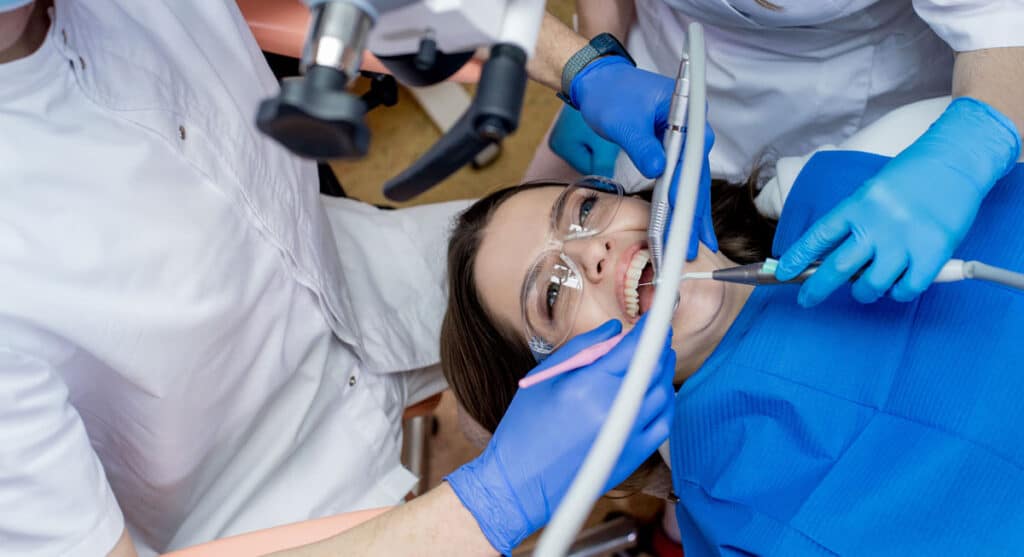Wisdom tooth removal London – everything you need to know

Wisdom tooth removal is one of the most common procedures that dentists and oral surgeons perform. In London, both private and NHS dental services offer wisdom tooth extraction, making it accessible to many. But before you decide whether this procedure is necessary for you, it’s essential to understand the ins and outs of wisdom tooth removal. We’ll cover everything you need to know, from the signs that indicate you might need your wisdom teeth removed, to the recovery process and the costs involved with this particular dental treatment, especially in London.
What are wisdom teeth?
Wisdom teeth, also known as third molars, are the last set of molars that typically emerge between the ages of 17 and 25. While some people have no problems with their wisdom teeth, others may experience issues due to insufficient space amongst existing teeth, which can lead to pain, swelling, infection, nerve injury, or even conditions like periodontal disease.
Wisdom teeth are a remnant of our evolutionary past when our ancestors needed these extra molars to help chew rigid plant material. Today, however, many people don’t have room in their jaws for these third molar teeth, which can result in complications and further dental problems.
Why do wisdom teeth need to be removed?
Wisdom teeth are often removed to prevent or resolve issues such as impaction, crowding, or infection. An impacted wisdom tooth means that it is trapped beneath the gum line or against another tooth; it can cause discomfort, swelling, and even severe pain. Impacted wisdom teeth are also prone to infections, which can affect nearby teeth and gums and cause problems like tooth decay. A dental surgeon will typically recommend tooth extraction if the teeth could prove a risk to your oral health.
Signs you might need wisdom tooth removal
Common symptoms of impacted wisdom teeth
Not all wisdom teeth need to be removed. However, if you’re experiencing certain symptoms, it might be a sign that your wisdom teeth are impacted and should be extracted. Some common symptoms include:
Pain at the back of the mouth: This can feel like a dull ache or sharp pain and may worsen over time.
Swollen or bleeding gums: If your wisdom teeth are causing irritation to your gum tissue, you might notice redness, swelling, or even bleeding.
Jaw stiffness or difficulty opening your mouth: This could indicate that the wisdom teeth are affecting your jaw’s movement.
Headaches: Pressure from impacted wisdom teeth can lead to tension headaches or even earaches.
Bad breath or a foul taste in your mouth: This occurs if an infection forms around the impacted tooth – it could even be a sign of periodontal disease.
When to see a dentist for wisdom teeth issues
If you experience any of the above symptoms, it’s crucial to get in touch with a dental surgery. A dentist will take X-rays to determine whether your wisdom teeth are impacted or likely to cause problems.
Regular dental check-ups can also help your dentist monitor the development of your wisdom teeth and recommend tooth extraction if necessary. Early intervention and the appropriate medical treatment can often prevent complications, such as infection or damage to other teeth.
The wisdom tooth removal process
Pre-consultation and X-rays
Before the wisdom tooth extraction procedure gets underway, a dentist will perform a thorough examination. This typically includes X-rays to assess the position of your wisdom teeth and their relationship to other structures, such as adjacent teeth or nerves. Based on these findings, they’ll discuss whether your wisdom teeth need to be removed and, if so, the best approach to take.
The procedure: what to expect
Wisdom tooth removal is usually performed at a dental practice or by a specialist oral surgeon at a surgical centre, depending on the complexity of the extraction. Here’s what typically happens:
Anaesthesia: You’ll receive local anaesthesia to numb the area around the wisdom teeth. For more complex cases, sedation or general anaesthesia might be used to help you relax or even sleep through the wisdom teeth removal procedure.
Incision and Extraction: If you have an impacted wisdom tooth, the dentist may need to make a small incision in the gum to access the tooth. In some cases, the tooth may be cut into smaller pieces to make the removal easier.
Stitches: Once the tooth is removed, the area may be stitched up to help with healing. Stitches often dissolve on their own, but your dentist will let you know if they need to be removed later.
Sedation and anaesthesia options
There are several types of sedation and anaesthesia available, depending on the complexity of the procedure and your anxiety levels:
Local Anaesthesia: Numbs only the extraction site.
Sedation Anaesthesia: Administered via an IV, it helps you feel relaxed and drowsy during the procedure.
General Anaesthesia: You’ll be unconscious for the duration of the surgery, which is typically used for more complex extractions or those who want a guaranteed pain-free experience.
Dentists are very used to seeing nervous patients so do not worry if this is you – they will work with you to be able to do the procedure in the way you are most comfortable with.
Choosing the right dental clinic in London
Factors to consider when selecting a clinic
When choosing a dental clinic for wisdom tooth removal in London, consider the following factors:
Location: Choose a clinic that is convenient for follow-up visits and recovery.
Experience: Look for a dentist or oral surgeon with extensive experience in wisdom tooth extractions.
Cost: Ensure you understand the pricing, including any additional costs for sedation or follow-up appointments.
Patient reviews: Read online reviews to get an idea of the clinic’s reputation, the dental team, and patient satisfaction.
Questions to ask your dentist before surgery
Before scheduling your wisdom teeth removal surgery, ask your dentist the following questions:
- How many wisdom teeth will be removed?
- What type of anaesthesia will be used?
- What is the expected recovery time?
- Are there any risks or potential complications with my case?
Cost of wisdom tooth removal in London
NHS vs private dental care: what’s the difference?
In London, and indeed the whole of the UK, you can choose between NHS and private clinics for wisdom tooth surgery.
The NHS offers wisdom tooth extraction at a significantly lower cost, especially for those eligible for free or reduced-cost treatment. However, the waiting times for NHS procedures can be long, and you might not have the same level of comfort or choice when it comes to sedation options.
Private dental care is more expensive, but it often provides shorter waiting times, more comprehensive sedation options, and a more personalised experience. Additionally, private clinics might offer more advanced technology, such as 3D imaging, to assist in complex extractions.
Average prices for wisdom tooth extraction in London
Wisdom teeth removal costs in London can vary significantly, depending on whether you opt for NHS or private treatment, and the complexity of the procedure:
NHS treatment: Typically falls under Band 2 treatment, which costs £70.70 for a wisdom tooth extraction.
Private treatment: Can range from £150 to £350 per tooth, but this depends on a few things.
Factors that affect the cost of the procedure
Several factors can influence the total wisdom tooth extraction cost:
Complexity of the extraction: Impacted teeth or those requiring surgery will be more expensive than simple extractions.
Sedation type: General anaesthesia or IV sedation will increase the cost compared to local anaesthetic.
Clinic location: Clinics in central London tend to be more expensive than those in outer boroughs.
Dental insurance: If you have private health or dental insurance, this may cover a portion of the cost.
Aftercare and recovery
Immediate post-surgery care tips
The recovery process after wisdom tooth removal is crucial to avoid complications. Here are some tips for post-oral surgery care:
Rest: Take it easy for the first 24 hours after surgery. Avoid strenuous activity, which could increase bleeding.
Ice packs: Apply ice packs to the outside of your face to reduce swelling.
Avoid touching the area: Don’t touch the wound with your tongue or fingers, as this can introduce bacteria and lead to infection.
Foods to eat and avoid after wisdom tooth removal
During the recovery period, it’s essential to stick to soft foods that won’t irritate the surgical site. Here’s a list of recommended foods:
Eat: Smoothies, mashed potatoes, yogurt, applesauce, and soups.
Avoid: Hard, crunchy, or spicy foods, as well as alcohol and caffeine.
Common side effects and how to manage them
It’s common to experience some discomfort, swelling, and minor bleeding after having wisdom teeth removed. Here are ways to manage common side effects:
Pain: Over-the-counter pain killers such as ibuprofen or paracetamol can help relieve pain.
Swelling: Ice packs and keeping your head elevated can minimise swelling.
Bleeding: Biting down on gauze for 30 minutes should control any bleeding. If it persists, contact your dentist.
How long does it take to recover?
Typical recovery timeline
The initial recovery after having a wisdom tooth removed usually takes about three to four days, but full healing can take a few weeks. Here’s a general timeline:
First 24 hours
You’ll likely experience some swelling and minor bleeding.
Day 2 to 3
Swelling usually peaks but starts to decrease. You may still need to take pain killers.
Day 4 to 7
Most of the swelling should subside, and the wound will begin to close.
Week 2
You should be mostly healed, though you may still have some tenderness around the site of the extraction.
What to expect during the healing process
While the healing process is usually smooth, it’s essential to avoid smoking, drinking through a straw, or engaging in strenuous activity during the first week, as these can cause complications like dry tooth socket, where the blood clot protecting the wound becomes dislodged.
Signs of infection or complications to watch for
Watch for the following signs of infection or complications:
Persistent bleeding: If bleeding doesn’t stop within the first few hours, contact your dentist.
Severe pain after 3 days: This could be a sign of dry socket, a painful condition that requires treatment.
Fever or pus: These are signs of infection and should be addressed immediately by your dentist.
Alternatives to wisdom tooth extraction
Can you avoid wisdom tooth removal?
Not all wisdom teeth need to be removed. If your wisdom teeth have fully erupted, are healthy, and aren’t causing any pain or crowding, your dentist may advise leaving them in place. Regular monitoring with X-rays and check-ups can ensure that your wisdom teeth aren’t causing any long-term issues for your other teeth.
Orthodontic solutions and other treatments
In some cases, orthodontic treatment, such as braces, may be used to manage any crowding caused by wisdom teeth. Additionally, antibiotics can sometimes treat infections around wisdom teeth, providing a temporary solution. However, if wisdom teeth continue to cause problems, extraction is often the most effective long-term solution.
Solve your wisdom teeth woes today!
Wisdom tooth removal can seem daunting, but it’s a common and safe procedure that can help prevent long-term dental issues. Whether you’re considering having a wisdom tooth extracted through the NHS or privately in London, understanding the process, costs, and recovery will help you make an informed decision.
Fulham Road Dental is an award-winning dental practice in London. We use the latest technology to provide general dentistry, cosmetic dentistry, and orthodontic treatment, all within a comfortable and welcoming environment. Our highly skilled team of dental and medical practitioners focus on delivering personalised care to each patient. So, whether you’re suffering with an impacted wisdom tooth, or you don’t have space in your mouth for this extra tooth, don’t suffer any longer, get in touch with us and let us relieve your pain.


